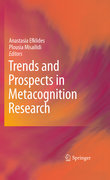
Trends and Prospects in Metacognition presents a collection of chapters dealing principally with independent areas of empirical Metacogition research. These research foci, such as animal metacognition, neuropsychology of metacognition, implicit learning, metacognitive experiences, metamemory, young children's Metacogition, theory of mind, metacognitive knowledge, decision making, and interventions for the enhancement of metacognition, have all emerged as trends in the field of metacognition. Yet, the resulting research has not converged, precluding an integration of concepts and findings. Presenting a new theoretical framework, Trends and Prospects in Metacognition extends the classical definitions offered by Flavell and Nelson to carry the prospect of more integrated work into the future. By opening the possibility to cross the boundaries posedby traditionally independent research areas, this volume provides a foundation for the integration of research paradigms and concepts and builds on the relationship between metacognition and consciousness, while integrating basic with applied research. Synthesizes research in the field; useful reference Provides methodologies for research Provides a new theoretical framework for metacognitive research INDICE: Introduction.- Animal metacognition.- The multiple facets of metacognition and their mechanism: Neuropsychological evidence.- Fringe consciousness as a form of metacognition.- The metacognitive role of familiarity in artificial grammar learning: Transitions from unconscious to conscious knowledge.- Cognitive interruption as object of metacognitive monitoring: Feeling of difficulty and surprise.- Tracking on-line metacognition: Monitoring and regulatingcomprehension.- Studying metacognition via the calibration paradigm using themethods of differential psychology.- The realism in children's metacognitive judgments of their episodic memory performance.- Confidence judgments in the event recall of children and adults: Does feedback contaminate confidence and can the effects be counteracted?.- Prospective memory failure and the metacognitive experience of 'Blank in the mind'.- Metacognition in young children: Current methodological and theoretical developments.- Metacognitive development inearly childhood: New questions about old assumptions.- Children’s theory of mind and metacognitive language: Preliminary evidence for a developmental relationship.- Metacognitive knowledge about decision-making: An investigation of naïve conceptions of decision processes through the 'Solomon' questionnaire.- Computer-supported learning in primary school - An observational study of self-regulated learning.- Writing worse than we tell? Exploring the relationship between metacognition and spelling in higher education.- Metacognition and reading comprehension: Developmental trends and gender differences.- Metacognition-based training programs in the field of reading among 4th grade Hungarian students.- University teachers as reflective learners – How may they influence their students?
- ISBN: 978-1-4419-6545-5
- Editorial: Springer
- Encuadernacion: Cartoné
- Páginas: 350
- Fecha Publicación: 29/06/2010
- Nº Volúmenes: 1
- Idioma: Inglés
